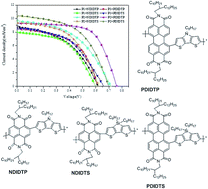Tuning the performance of the non-fullerene organic solar cells by the polarizability
Abstract
We report here the synthesis and characterizations of a novel series of acceptor copolymers with a broad absorption band. The acceptor polymers were synthesized as a copolymer of perylenediimide (PDI) and naphthalene imide (NDI) along with dithieno[3,2-b:2′,3′-d]silole (DTS) and N-alkyl dithieno[3,2-b:2′,3-d]pyrroles (DTP). When the dipole moment and polarizability of the acceptor polymer are compared, it is observed that when the dipole moment decreases, the polarizability becomes larger. The polarizability of polymers containing PDI is significantly greater than those containing NDI, and their polarizability change is in accordance with the change in the transient fluorescence lifetime. It was also found that the power conversion efficiency of the non-fullerene solar cell was strongly correlated to polarizability. The results demonstrate that the polarizability can be utilized to screen novel donor and acceptor polymers for the design and synthesis of high-performance solar cells.



 Please wait while we load your content...
Please wait while we load your content...